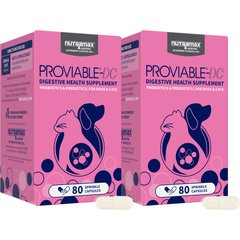Is Your Indoor Cat Safe from Parasites?
It’s a dilemma I see often in my veterinary practice — indoor cats that have parasites. Many cat owners believe that keeping their cats indoors protects them from parasite infestations and/or infections. Unfortunately, that’s not always true.
Indoor cats can become infested with fleas quite easily. Disturbingly, fleas can overwinter in your home very easily as well. Even outdoors, under the right circumstances, fleas can be active in the winter. Indoors, fleas are never exposed to freezing temperatures or other adverse weather conditions, making it easy for these parasites to survive indefinitely.
To make matters even worse, fleas can be difficult to find. Being fastidious groomers, many cats remove the evidence of an active flea infestation from their skin and hair coat, leaving an unsuspecting cat owner with no idea that there is indeed an existing flea problem.
Recommended Pet Products
- Nutramax Proviable Probiotics & Prebiotics Digestive Health Supplement for Dogs & Cats, 160 count$89.98Chewy Price
- Fera Pets USDA Organic Pumpkin Plus Fiber Support for Dogs & Cats, 90 servings$34.95Chewy Price
- All Four Paws Comfy Cone E-Collar for Dogs & Cats, Black, Small$20.24Chewy Price
- Virbac Epi-Otic Advanced Ear Cleaner for Dogs & Cats, 4-fl oz bottle$13.19Chewy Price
Tapeworms also can be a problem for indoor cats. Since tapeworms are carried by fleas, this should come as no great surprise. Your cat can get tapeworms by swallowing a flea that is carrying tapeworms. This can happen when your cat grooms. Grooming activity can result in ingestion of live fleas.
Roundworms also may be a threat to indoor cats, particularly if there is a rodent problem in the home. Mice can enter a home through very small openings, sometimes even as small as a quarter. It’s not unusual to find a rodent problem even in a well-maintained home. Cats, being the predators that they are, will naturally hunt these animals, even when well-fed. I’ve experienced this myself, finding my cat Dillon with a mouse. It was surprising because I had found no evidence of mice in my home prior to the incident, nor have I found any signs since then.
Heartworms are another parasite that can infect cats that are housed strictly indoors. Heartworms are passed through the bite of an infected mosquito. We all know all too well that mosquitoes can find their way indoors. It only takes one bite to pass the parasite along to your cat.
Clearly, it is far from impossible for an indoor cat to suffer from both external and internal parasite infestations. So what can you do to protect your cat?
- Use a safe and effective flea product to prevent flea infestations. Consult your veterinarian for help in choosing the best product for your cat. Follow the directions on the label carefully when using a flea product. Do not use flea products not specifically labeled as being safe for cats. Many products that are safe for dogs are not safe for cats.
- Administer a monthly heartworm preventive medication to your cat year ‘round. Many of these products also provide some protection against roundworms and hookworm infections.
- Have your cat examined by your veterinarian on a regular basis.
- Have your cat’s feces examined periodically for parasites. This should be a microscopic examination performed by your veterinarian. It is possible to see adult roundworms or tapeworm segments in your cat’s feces. If you see worms in your cat’s feces, bring the worm to your veterinarian for identification.
Living indoors (or primarily indoors with leashed walks outdoors and/or access to an outdoor enclosure) is the safest lifestyle for your cat. However, your cat is not safe from parasites even if living indoors. It is important to take the proper precautions to protect both yourself and your cat.

Dr. Lorie Huston
Image: Sammy by Erik Eckel / via Flickr




